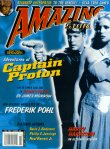Short reviews by Mark R. Kelly. Longer reviews of these and other stories will appear in Locus Magazine.
|
|
 Two Turtledoves
Two Turtledoves
Harry Turtledove,
''Twenty-one, Counting Up'' (Analog Dec 1999)
''Forty, Counting Down'' (Asimov's SF Dec 1999)
A pair of novellas that tell the same story from different perspectives -- the perspectives of the same person, nineteen years apart. In the Asimov's story Justin Kloster, 40-year-old software engineer, builds a time machine in 2018 and travels back to counsel his youthful self about his relationship with Megan, the only love of Justin's life, but whose marriage with him ended in divorce. The Analog story is from the youthful Justin's point of view in 1999, as he meets his older self and is convinced to cooperate with the older Justin's scheme to take over younger Justin's life for a few weeks -- including his dates with Megan. Aside from a couple obvious practical difficulties, the stories work quite well, especially in their nuanced depictions of cross-generational relationships -- older vs. younger Justin; older man vs. younger woman. Of the two stories the one in Asimov's stands on its own better (and it has the better ending), but the pair are worth reading together as an interesting experiment in telling two sides of the same tale.
§
 Asimov's Science Fiction December 1999
Asimov's Science Fiction December 1999
Ian R. MacLeod, ''The Chop Girl''
Historical fantasy told by a woman serving on a British air base during World War II. After dating several pilots who don't return from their missions, she gains a reputation as a 'chop girl', an omen of death. Then she meets dashing Walt Williams, old for a pilot at 30, preternaturally lucky, perhaps supernaturally gifted. They are like the irresistible force and the immovable object; when they spend a few hours together after a Christmas party, and he departs on another mission, what will happen? MacLeod's vivid prose adds to the intensity of this moving fantasy.
Mike Resnick, ''Hunting the Snark''
In last month's issue Walter Jon Williams translated Jason and the Argonauts into a relatively modern setting; now Resnick patterns a planetary adventure tale on Lewis Carroll's ''The Hunting of the Snark''. A safari guide brings his clients to the unexplored planet Dodgson IV, where they soon detect signs of a large solitary predator -- that soon begins preying on them. The story evokes a cliche about solitary alien critters familiar from van Vogt and Star Trek, but its translation of Carroll's poem, right up to its final transforming line, is clever, and on its own terms as an adventure tale, it's suspenseful and tautly told.
§
 Interzone October 1999
Interzone October 1999
Greg Egan, ''Border Guards''
The city of Noether is an artificial environment where aging, disease, and violence have been overcome; where the tedium of immortality is broken by periods of 'little death', to shuffle the deck of available friends and lovers; and where people spend lives in continuous study or playing games like quantum soccer, which Egan dazzlingly describes in the story's opening pages. (The game is illustrated with a Java applet on this page of Egan's website.) Jamie, a man just emerged from sadness, meets a woman who tells an agonized story about the death of her friend, which allows Egan the opportunity to sketch the history of immortality and philosophize about the meaning of death. Egan is one of the very few SF writers who considers how the human condition might fundamentally change through advanced technology, and, as usual, his thinking is revelatory.
Robert Reed, ''At the Corner of Darwin and Eternity''
Despite the warnings of her parents, a young girl befriends the crazy old man next door who won't take the senescence treatments like everyone else. She explores the ponds in his back yard and he explains how he creates new species of fish and frogs; just as dodos evolved from pigeons, he can create new species for the modern world to make up for the lost diversity of extinct species. But there's a horrible surprise waiting. The story is clever in a black way for turning the usually admirable quality of diversity into something frightfully perverse.
§
 Amazing Stories Fall 1999 and Winter 2000
Amazing Stories Fall 1999 and Winter 2000
Frederik Pohl, ''Hatching the Phoenix''
A two-part novella set in the Heechee universe, though only incidentally involving the Heechee aliens themselves. It's set on an observatory built 6000 light years from the star that exploded to become the Crab Nebula; there astronomers are positioned behind a gravitational lense to view not only the star before it explodes, but to study the planet that orbited it for signs of intelligent life. Klara, perhaps the richest person alive and the money behind the project, arrives at the observatory as images start to come in. Meanwhile she battles personal problems when a journalist, who happens to be her current lover, arrives to cover the event with a nubile young assistant, and Klara's shipmind badgers her to give up her biological body and become an immortal machine person. Pohl's mix of grand spectacle and personal psychology makes for the same effective storytelling blend that made Gateway itself such a success.
§
(Fri 12 November 1999)


 Two Turtledoves
Two Turtledoves
 Asimov's Science Fiction December 1999
Asimov's Science Fiction December 1999
 Interzone October 1999
Interzone October 1999
 Amazing Stories Fall 1999 and Winter 2000
Amazing Stories Fall 1999 and Winter 2000